Teaching Abroad in Thailand for Teens
Calling all high schoolers! Are you looking for an amazing opportunity this summer? Something different than that part time summer job?
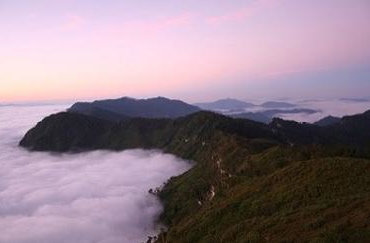
The flight to Chiang Mai from Bangkok takes only one hour. In that short amount of time, I left behind a bustling, urban, major-city and arrived in a smaller city surrounded by mountains, lush forests, and over 300 Buddhist Temples dotting the sides of the local hills.
Chiang Mai is Thailand’s second-largest city, but that fact never occurred to me as I walked along the quiet streets and in and out of meticulous gardens. In Thai, Chiang Mai means “New Walled City.” New, in this case, means 1296, when Chiang Mai was founded.
From there, I traveled 3 hours further North by car to the Phayao Province, virtually enveloped by mountains, valleys and National Forests. The city of Phayao was founded in 1096. With only modest facilities and conveniences, it is an enchanting community with delightful natural beauty and fascinating religious sites. It is 45 kilometers from here, into an even more rural area, that I arrived at a very unique GeoVisions volunteer project. Any attempt to categorize the site is going to be tricky. Baan Kru Mookda (in Thai it means “house of Kru Mookda”) can best be described as a camp for underprivileged Thai students run by Kru Mookda and her family. Mrs. Mookda, seen here in the bright yellow shirt, received the 1999 Race Against Poverty award from Kofi Anan on behalf of the United Nations. Here on our website, you will soon be able to view an excerpt from a documentary filmed for the United Nations Development Project about Mrs. Kru Mookda. The film was premiered at the awards ceremony in New York.
Any attempt to categorize the site is going to be tricky. Baan Kru Mookda (in Thai it means “house of Kru Mookda”) can best be described as a camp for underprivileged Thai students run by Kru Mookda and her family. Mrs. Mookda, seen here in the bright yellow shirt, received the 1999 Race Against Poverty award from Kofi Anan on behalf of the United Nations. Here on our website, you will soon be able to view an excerpt from a documentary filmed for the United Nations Development Project about Mrs. Kru Mookda. The film was premiered at the awards ceremony in New York.
Spending part of a day with Kru Mookda was an honor and experience I will not soon forget. Mrs. Mookda and I met first, sitting on mats beneath a tree, shoes off, sipping water and eating fresh fruit. From there we walked around the camp talking with the children and looking at the camp’s rice paddies, which are cared for totally by the children, the fish ponds and the buildings where classes are held, the computer center and radio station. It is from the children’s radio station that 8,000 households get news and local information.
The pampered traveler might find day-to-day living at Baan Kru Mookda a challenge. In fact, I’m not sure the pampered traveler would even find Baan Kru Mookda or even Phayao for that matter. GeoVisions volunteers, however, find it relaxing. There is no English television or great shopping destinations in the near vicinity. GeoVisions volunteers pamper themselves with lots of reading material, a deck of cards, travel-size board games and a sense of exploration. The surrounding area is breathtaking. One also gets a very real appreciation of the Thai culture since Phayao is not a tourist destination.
The camp (also referred to as an orphanage) does not have many of the conveniences that we are accustomed to. For instance, there are only cold showers, squat toilets, and mosquito netting over all of the beds. The food is 100% Thai. Thai food revolves around rice. Many Thai’s will start a conversation with, “gin khao yung,” which means, “have you eaten yet?” Around rice you will find pork, fish or chicken and the addition of hot spices, coconut milk, vegetables, Thai curry, and lemon grass. The living conditions are absolutely fine…they are just different than what many people are used to and they take some adjustment time.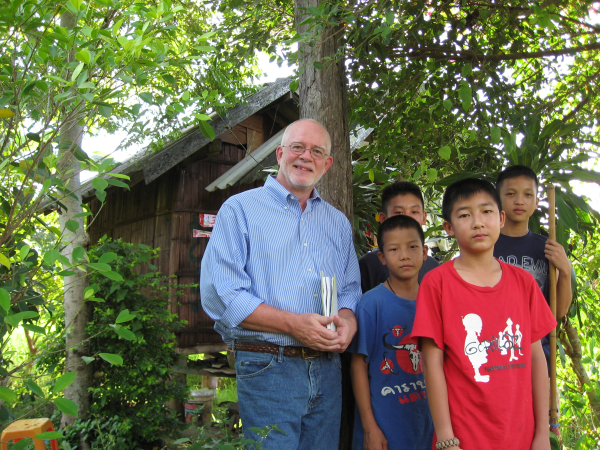 The boys are all around 12 years old (the oldest being 15), while the girls have a slightly higher average age of 13 to 14. The girls live in a single, long dormitory with adjoining squatter toilets and showers. Female volunteers live in the dorm building with the girls. The boys live in groups in huts that border the rice paddies and fishponds. The area also contains an empty dormitory for visitors, a building with a radio station and ten computers (all donated by Microsoft), a meeting hall, a recreation center with basketball hoops, an outside kitchen and dining room for the children, various fruit trees, a long canopied table area for dinner guests or studying at night, and a beautiful sala for relaxing in at night.
The boys are all around 12 years old (the oldest being 15), while the girls have a slightly higher average age of 13 to 14. The girls live in a single, long dormitory with adjoining squatter toilets and showers. Female volunteers live in the dorm building with the girls. The boys live in groups in huts that border the rice paddies and fishponds. The area also contains an empty dormitory for visitors, a building with a radio station and ten computers (all donated by Microsoft), a meeting hall, a recreation center with basketball hoops, an outside kitchen and dining room for the children, various fruit trees, a long canopied table area for dinner guests or studying at night, and a beautiful sala for relaxing in at night.
In 1989, Kru Mookda established this project to provide accommodation, education, and a better quality of life for local children and children from nearby mountain tribes whose families are unable to support them. For over a decade, Kru Mookda has been taking in children who have been abused, are extremely impoverished, or face other hardships. Initially the objective of the project was to educate and provide opportunities specifically to young women in the area. Thailand’s notorious sex trade is fueled primarily by young, poor girls who come from the countryside because of parental pressures to help the family earn enough money to survive or, if uneducated, to survive themselves. Kru Mookda has devoted her life to doing research in sociology and community development, as well as teaching throughout Thailand.
The project, which includes volunteers from GeoVisions, strives to make the children live as independently as possible. Thus, they are responsible for farming rice, picking fruit, fishing, buying meat or noodles, cooking their own food, cleaning the camp, washing their clothes, walking to school, and setting up their own living rules. Every night before bed, the children meet in the gathering hall to pray and discuss any new issues or problems. It is a sort of miniature government with a set of representatives (usually the more elder children) who meet with Kru Mookda. The children all adhere to the rules and carry out their responsibilities. Every morning they will wake up at 5:30 to begin preparing breakfast or doing chores, walk or ride to school at around seven, come home at around four, begin cooking dinner and do chores, maybe play some soccer or games, and finish the night with homework and a gathering in the meeting hall.
There is a saying in Thai that if it isn’t Sanook (fun or from the heart), it isn’t worth doing. When we opened the program to GeoVisions’ volunteers, I thought about naming the program “Sanook in the North.” OK, that isn’t true. But what is very true is how much the children enjoy the volunteers and how touching it is to listen to them describe how much they miss them once they are gone. I left Baan Kru Mookda ready to tell the story and committed to sending as many GeoVisions volunteers as I can to the orphanage. Kru Mookda has made a difference in lives for many years, and through her vision, GeoVisions’ volunteers have an opportunity to impact young lives and an entire rural community forever.
For more information about Baan Kru Mookda and the region, I have provided Internet links, below.
Best wishes on your quest for Sanook,
Randy LeGrant
Executive Director
GeoVisions
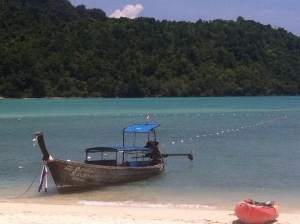
Calling all high schoolers! Are you looking for an amazing opportunity this summer? Something different than that part time summer job?

4 min read
I'm sitting here at my desk this Wednesday morning before Thanksgiving and just opened up iTunes and chose some holiday music. I know, a little...
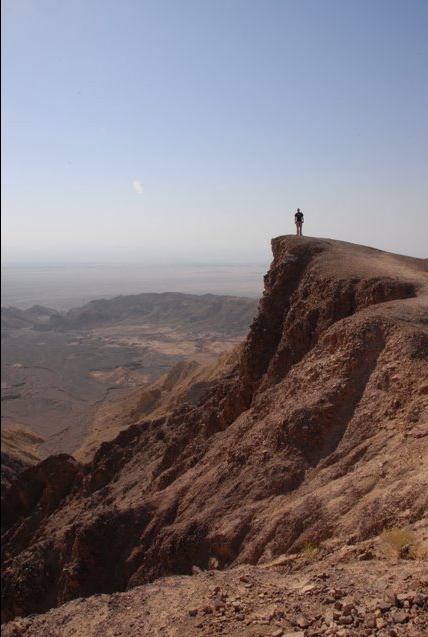
I took my first trip abroad in 1976. As an American, that was our Bicentennial year and so my passport was in celebration of that fact. I still have...
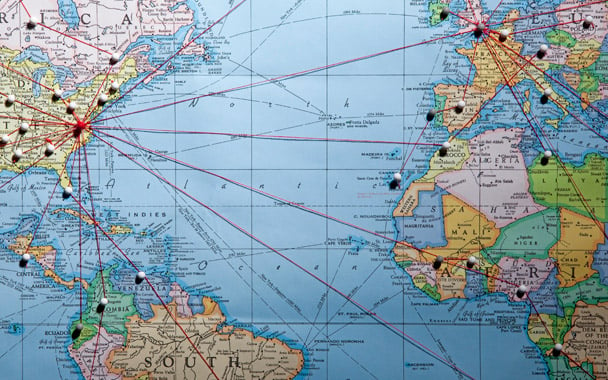
Yesterday I wrote a post about The Five Things I Wish I Knew When I Decided To Travel Abroad. In all honesty, the post was "The Ten Things..." but I...
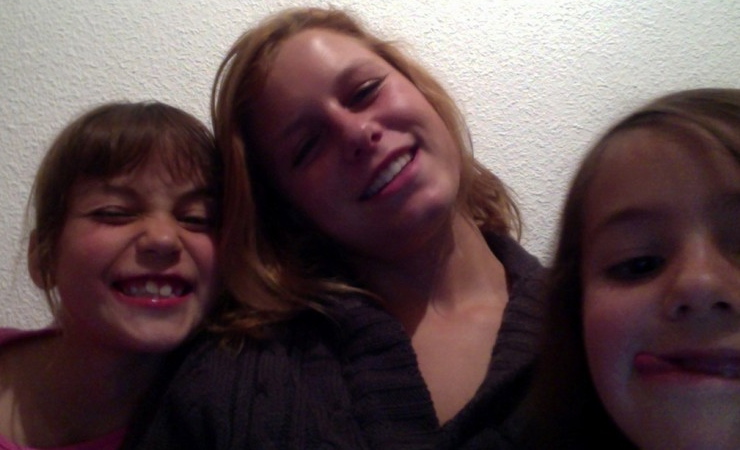
Yesterday I wrote a post about "How I See You." I thought I would follow up that post with actual comments from GeoVisions' volunteers in-country...

The last time I wrote a Blog Post was February 26. Over four months this Blog has been dormant. That's embarrassing. Not that people stand in line...